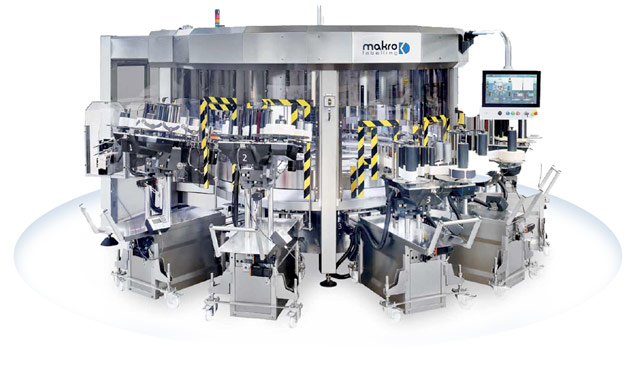Modularity, flexibility and practicality are key concepts in a company whose strong point is technological innovation and development. This is what the market wants and this is what customers get from the Italian based Makro Labelling, international standard setter for industrial labelers in the beverages, food, detergent and pharmaceutical sectors.
The thirty years’ experience of its founders, a team of 90 people, a dense and well-organized sales network consisting of the branch offices Makro UK for the United Kingdom and Makro North America in Saint Philippe (Montreal) for Canada and the USA, together with agents and representatives in the most important countries throughout the world, plus an impeccable assistance and spare parts service guarantee satisfaction of every labelling need and constant expansion on all the most important international markets.
A range of labellers for production speeds of 1,500 to 50,000 b/h
The range includes labelers able to process from 1,500 to 50,000 bottles per hour, applying up to five labels per bottle and available in wet glue, hot melt, self-adhesive and combined versions.

For companies with limited production requirements, the MAK 01, MAK 02 and MAK 1 labelers provide speeds of up to 12,000 b/h with mechanical or electronic rotation of the bottle plates. With special applications and able to cope with production speeds of up to 50,000 b/h, the MAK 2, 3, 4, 5, 6, 7 and 8 labelers, on the other hand, satisfy the needs of medium to large companies.
The range includes a high speed self-adhesive labeler with reel winders and non-stop system enabling production to continue at maximum speed even during reel changes and a combined labeler to apply the fiscal guarantee seal.
For the high volume PET market, such as the water and soft drinks sector, Makro Labelling has developed the MAK Roll Feed series of rotary labellers. The 6,000 b/h to 40,000 b/h production speed and use of wrap-round plastic labels on a reel with hot melt application guarantee maximum economic benefits in the production process.
The modularity of the machine also allows the roll feed unit to be replaced with a hot melt unit for pre-cut, wet glue or self-adhesive labels.
Again designed for the water and soft drinks market, but needing between 6,000 and 16,000 b/h, the new series of MAKLINE Roll Feed labellers features motorized axles and brushless motors to minimize costs while maintaining meticulous labelling quality.
The new double-station self-adhesive MAKLINE is, on the other hand, designed for the beverages, food, detergent and pharmaceutical sectors. It packages large and small containers and offers the same high quality labeling as a rotary machine.

In common with the entire Makro range, the MAKLINE is fitted with the Vision Control system to verify the quality and correctness of the packaging and manage rejects. The Follower optical guide system (an exclusive patent) enables the bottles to be aligned for application of the labels in precise positions with respect to a reference on the bottle and reduces format change times and costs. It is available in carbon fiber and fitted with a line scan camera.
Thanks to a special, patented paper delivery system, the new MAK AHS2 self-adhesive labeling module responds to the need for faster, more precise machines. It guarantees a linear speed of 100 meters a minute at a label pitch of 20mm.
The technical and R&D departments monitor the market closely to understand its demands and anticipate them with new solutions able to offer efficiency, speed and a concrete response to specific labelling needs.
Latest developments include the prototype of C Leap, a new, truly revolutionary labelling system, and two new inspection systems :M.A.I.A. (Makro Advanced In-line Analysis) and A.L.I.C.E. (Advanced Label Inspection and Control Environment) – which guarantee high performance, less production rejects and the highest finished product quality.

